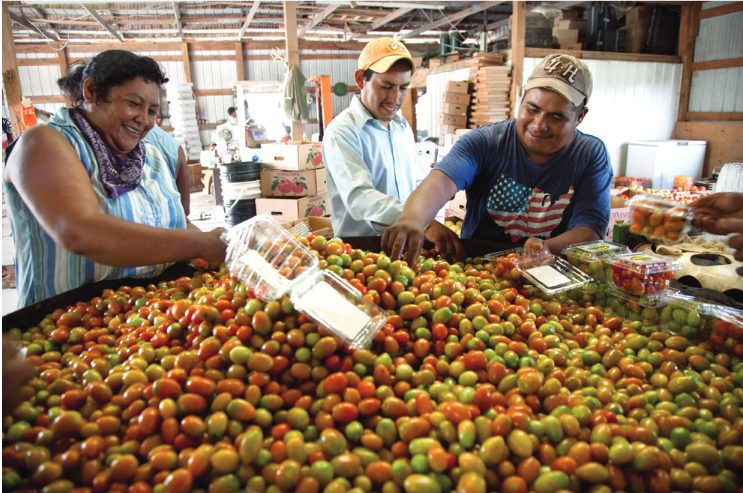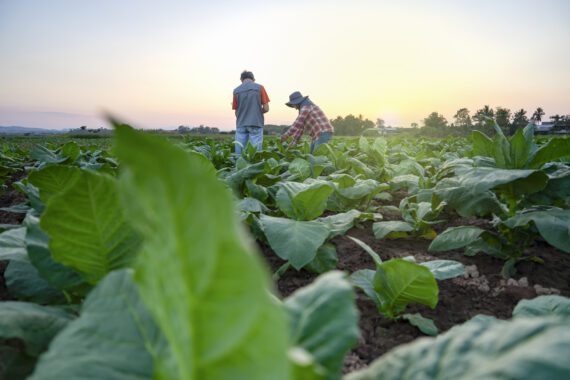In the face of growing global and U.S. hunger, our faith in God and efforts to work cooperatively to care for each other are essential to saving lives and alleviating suffering. As exemplified by King David when he prayed for his son and successor, Solomon, leaders have a responsibility to care for those in their charge: “He will rescue the poor who cry out and the afflicted who have no helper. He will have pity on the poor and helpless and save the lives of the poor. He will redeem them from oppression and violence, for their lives are precious in his sight” (Psalm 72:12-14).
Bread for the World believes that every human being is created in the image of God, and thus, has the right to enough nutritious food for good health. We therefore advocate to elected officials to establish effective systems, structures, and policies that affirm equality and advance equity to alleviate hunger and poverty.
Among these structures and systems, a sustainable and equitable food system is essential to provide access to enough nutritious food. Such food systems include activities and resources necessary to bringing food from its source—farms, ranches, oceans—to people’s forks.
Because billions of people work in various parts of U.S. and global food systems, such as farming, processing food, and cooking, it is essential for these systems to function effectively to protect people and practice good stewardship of our planet.
The weaknesses of our current global food system are laid bare by the high and rising numbers of people living with hunger. Yet we know there is hope. Farmers are working to produce enough food under difficult conditions, parents are working to serve their children nutritious meals, and researchers are working to find new ways of reducing greenhouse gas emissions and adapting to climate change. Bread for the World supports the following principles essential to equitable and sustainable food systems:
Nutrition
Food systems should prioritize sufficient supplies of nutritious food for all. Nourishing people should be the primary function of a food system. Actions to support nutritious food for all include:
- Doing more to prevent malnutrition, a leading cause of death among children under 5, particularly those in the critical “1,000 days” nutrition window between pregnancy and a child’s second birthday.
- Strengthening incentives and support for farmers to grow healthy, nutrient-dense foods in greater quantities.
- Ensuring historically excluded groups have access to vital safety net nutrition programs.
Equity
The global community should move food systems toward equitable outcomes for all people. All societies have structures and systems that discriminate against people because of their race, gender, religion, ethnicity, or other identity traits, and food systems are no different. Current food systems often produce unequal impacts for historically marginalized communities related to hunger, malnutrition, and poverty. Equitable policies will:
- Create more opportunities for socially disadvantaged farmers in the United States by increasing access to resources such as credit and government extension services.
- Ensure equitable access to U.S. foreign assistance programs and resources for groups that have historically been excluded yet are critical to ensure food security and nutrition, such as women smallholder farmers, national
and local civil society organizations, and research institutions in lower-income regions. - Ensure fair wages, hours, and working conditions to enable workers in all sectors of the global food system to earn a decent living while their right to dignity is upheld.
Climate
Food systems must make rapid progress toward environmental sustainability by taking the necessary actions to reduce greenhouse gas emissions from agricultural activities already seen. Sustainable food systems meet people’s needs today without undermining the food security of future generations.
A food system strategy that is smart on climate will:
- Support research, development, and implementation of techniques to reduce emissions in the food system and to support communities to adapt to the impacts of climate change and build resilience.
- Reduce food waste and food loss to reduce emissions. Among many ways of accomplishing this are creating better ways of collecting and distributing surplus food in the United States and improving access to storage
facilities that prevent food spoilage in lower-income countries.
We urge our nation’s leaders to enact policies and make investments that embody these key principles to improve the U.S. and global food systems and end hunger and malnutrition.



